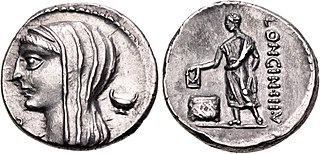Related Research Articles

The decemviri or decemvirs refer to official ten-man commissions established by the Roman Republic.

The gens Cassia was a Roman family of great antiquity. The earliest members of this gens appearing in history may have been patrician, but all those appearing in later times were plebeians. The first of the Cassii to obtain the consulship was Spurius Cassius Vecellinus, in 502 BC. He proposed the first agrarian law, for which he was charged with aspiring to make himself king, and put to death by the patrician nobility. The Cassii were amongst the most prominent families of the later Republic, and they frequently held high office, lasting well into imperial times. Among their namesakes are the Via Cassia, the road to Arretium, and the village of Cassianum Hirpinum, originally an estate belonging to one of this family in the country of the Hirpini.
The lex Canuleia, or lex de conubio patrum et plebis, was a law of the Roman Republic, passed in the year 445 BC, restoring the right of conubium (marriage) between patricians and plebeians.
Agrarian laws were laws among the Romans regulating the division of the public lands, or ager publicus. In its broader definition, it can also refer to the agricultural laws relating to peasants and husbandmen, or to the general farming class of people of any society.
The gens Aebutia was an ancient Roman family that was prominent during the early Republic. The gens was originally patrician, but also had plebeian branches. The first member to obtain the consulship was Titus Aebutius Helva, consul in 499 BC.
Leges Genuciae were laws passed in 342 BC by Tribune of the Plebs Lucius Genucius Aventinensis.
The gens Apustia was a plebeian family at Rome during the period of the Republic. The first member of this gens who obtained the consulship was Lucius Apustius Fullo, in 226 BC.
The gens Verginia or Virginia was a prominent family at ancient Rome, which from an early period was divided into patrician and plebeian branches. The gens was of great antiquity. It frequently filled the highest honors of the state during the early years of the Republic. The first of the family who obtained the consulship was Opiter Verginius Tricostus in 502 BC, the seventh year of the Republic. The plebeian members of the family were also numbered amongst the early tribunes of the people.
The gens Fabricia was a plebeian family of ancient Rome. Members of this gens are known from the early third century BC down to the end of the Republic, but they seldom attained positions of importance in the Roman state.
Leges may refer to:

The lex Publilia, also known as the Publilian Rogation, was a law traditionally passed in 471 BC, transferring the election of the tribunes of the plebs to the comitia tributa, thereby freeing their election from the direct influence of the Senate and patrician magistrates.
Gaius Sulpicius Peticus was a prominent 4th-century BC Roman politician and general who served as consul five times and as dictator once. Sulpicius was a member of the gens Sulpicia, a prominent patrician family which had attained the consular dignity a great number of times following the foundation of the republic. However, the familial relationship between Sulpicius and other known contemporary members of the gens is unknown, with the only information about his heritage being that his father was named Marcus and his grandfather was named Quintus.
Lucius Genucius Aventinensis, was a nobleman of ancient Rome of the Genucia gens who lived in the 4th century BC. He, along with Quintus Servilius Ahala, was one of the two consuls of ancient Rome in 365 BC.
The gens Genucia was a prominent family of the Roman Republic. It was probably of patrician origin, but most of the Genucii appearing in history were plebeian. The first of the Genucii to hold the consulship was Titus Genucius Augurinus in 451 BC.
Appius Claudius Crassus was a consular tribune of the Roman Republic in 403 BC.
Gnaeus Genucius Augurinus came from the ancient plebeian gens Genucia and was a high magistrate of the early Roman Republic.
Lucius Genucius Aventinensis was a Roman politician in the fourth century BC.
Genucius is a name. Notable people with the name include:
Gnaeus Genucius Aventinensis, M. F. M. N., was a nobleman of ancient Rome of the Genucia gens. He served as consul in 363 BCE, in which year the senate was chiefly occupied in endeavoring to appease the anger of the gods, owing to the severe pestilence and flooding that Rome was suffering. To this end, Lucius Manlius Capitolinus Imperiosus was nominated to the office of dictator to perform the rite of clavum fingere to mollify the angry gods.
Lucius Genucius (Aventinensis) was a nobleman of the Genucia gens of ancient Rome who lived in the 4th century BCE.
References
- ↑ Smith, William (1849). "Aventinensis". Dictionary of Greek and Roman Biography and Mythology . Vol. 1. Taylor, Walton and Maberly and John Murray. p. 418. Retrieved 2024-12-31.